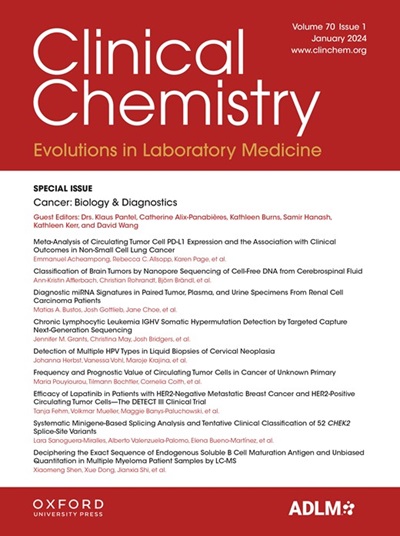A-226 Optimizing the laboratory workflow with healthcare informatics
IF 6.3
2区 医学
Q1 MEDICAL LABORATORY TECHNOLOGY
引用次数: 0
Abstract
Background In healthcare informatics, technology is used to streamline processes to improve patient care and health outcomes. For example, informatics can help modern laboratories experiencing increased testing demands with fewer resources. Small- and medium-sized labs, including physician office labs, however, tend to have challenges with cost and availability of resources for installing informatics solutions. Our aim was to evaluate the QuidelOrtho® Results Manager™ System software for streamlining operations to improve overall laboratory performance in multiple sites. Methods The QuidelOrtho Results Manager System software is an informatics solution that focuses on four areas in the laboratory workflow: patient results, rules/standard configuration, quality control, and moving averages. The software was implemented at multiple sites globally, where pre- and post-implementation surveys were conducted. Questions on current tube workflow and informatics setup were asked in the pre-implementation portion, as well as time to complete tasks such as sample validation and quality control. The post-implementation survey included questions about installation and implementation time and ease of use. In addition, customer feedback was obtained for future improvements to the QuidelOrtho Results Manager System. Results All sites previously have not had middleware installed. Highlights from post-implementation survey responses from customers included seamless integration into current workflow, and overall ease of use and customization of software tools with an intuitive interface. Complex rules were set up without extensive training, and troubleshooting and decision-making processes were improved for more efficient patient care. The QuidelOrtho Results Manager System also facilitated standardization of result interpretation and management of abnormal results while also providing in-depth quality control (QC) review, which supported improvements to workflow and efficiency. Processes for updating ranges, adding assays, and storing samples were also improved. Installation time was relatively quick, and turnaround times were reduced compared to those collected pre-implementation. Conclusion In conclusion, the QuidelOrtho Results Manager System was shown to be an ideal solution for streamlining operations to improve overall laboratory performance at multiple sites located in different countries. This is supported by survey findings including reduction in turnaround time, efficiency in obtaining results more quickly, and ease of use and installation without coding expertise. Future improvements to the software will be incorporated in later stages with further implementation in more laboratories.A-226利用医疗保健信息学优化实验室工作流程
在医疗保健信息学中,技术用于简化流程以改善患者护理和健康结果。例如,信息学可以帮助现代实验室用更少的资源体验到增加的测试需求。然而,包括医生办公室实验室在内的中小型实验室往往面临安装信息学解决方案的成本和资源可用性方面的挑战。我们的目的是评估QuidelOrtho®Results Manager™系统软件,以简化操作,提高多个站点的整体实验室性能。方法QuidelOrtho结果管理系统软件是一个信息学解决方案,重点关注实验室工作流程中的四个方面:患者结果、规则/标准配置、质量控制和移动平均线。该软件已在全球多个地点实施,并在实施前和实施后进行了调查。在实施前部分,对当前试管工作流程和信息学设置的问题进行了询问,以及完成样品验证和质量控制等任务的时间。实施后调查包括关于安装和实施时间以及易用性的问题。此外,还获得了客户反馈,以便将来改进QuidelOrtho结果管理系统。结果所有站点之前都没有安装中间件。来自客户的实施后调查反馈的亮点包括与当前工作流程的无缝集成,以及具有直观界面的软件工具的总体易用性和定制性。在没有经过广泛培训的情况下,制定了复杂的规则,改进了故障排除和决策过程,以提高患者护理的效率。QuidelOrtho结果管理系统还促进了结果解释和异常结果管理的标准化,同时还提供了深入的质量控制(QC)审查,从而支持了工作流程和效率的改进。更新范围、添加化验和保存样品的流程也得到了改进。安装时间相对较快,并且与实现前收集的数据相比,周转时间减少了。总之,QuidelOrtho结果管理系统被证明是简化操作的理想解决方案,可以提高位于不同国家的多个站点的整体实验室性能。调查结果支持了这一点,包括减少周转时间、更快地获得结果的效率,以及无需编码专业知识即可轻松使用和安装。软件的未来改进将在后期阶段纳入,并在更多实验室进一步实施。
本文章由计算机程序翻译,如有差异,请以英文原文为准。
求助全文
约1分钟内获得全文
求助全文
来源期刊

Clinical chemistry
医学-医学实验技术
CiteScore
11.30
自引率
4.30%
发文量
212
审稿时长
1.7 months
期刊介绍:
Clinical Chemistry is a peer-reviewed scientific journal that is the premier publication for the science and practice of clinical laboratory medicine. It was established in 1955 and is associated with the Association for Diagnostics & Laboratory Medicine (ADLM).
The journal focuses on laboratory diagnosis and management of patients, and has expanded to include other clinical laboratory disciplines such as genomics, hematology, microbiology, and toxicology. It also publishes articles relevant to clinical specialties including cardiology, endocrinology, gastroenterology, genetics, immunology, infectious diseases, maternal-fetal medicine, neurology, nutrition, oncology, and pediatrics.
In addition to original research, editorials, and reviews, Clinical Chemistry features recurring sections such as clinical case studies, perspectives, podcasts, and Q&A articles. It has the highest impact factor among journals of clinical chemistry, laboratory medicine, pathology, analytical chemistry, transfusion medicine, and clinical microbiology.
The journal is indexed in databases such as MEDLINE and Web of Science.
 求助内容:
求助内容: 应助结果提醒方式:
应助结果提醒方式:


